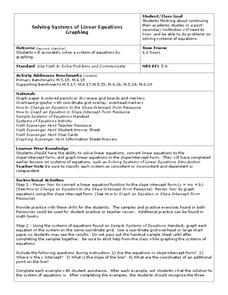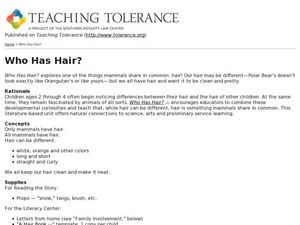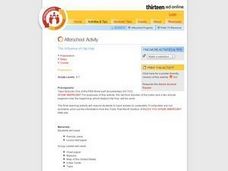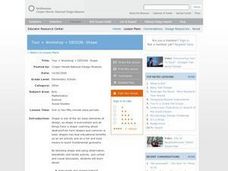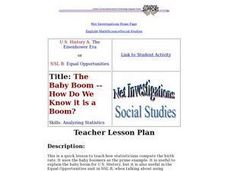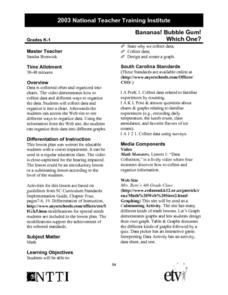Curated OER
Computer Doubles
Students practice doubling the numbers one through five while viewing a projected computer activity using MathKeys software. They stamp numbers onto an activity sheet that corresponds to the number of objects on the screen and then write...
Curated OER
Fourths of Sets
Students create a set of cards that represent factors of four and use these cards to play a game in which they practice separating numbers into fourths. They first practice separating numbers into fourths with a projected computer...
Curated OER
Comparing Sizes And Shapes
Students compare, resize, and check various shapes by size using a comparison mat from the MathKeys program. Working in pairs, they place three similar shapes on the screen and state which is the largest and smallest in area. They also...
Curated OER
Area And Perimeter
Fifth graders practice the skills of finding the perimeter and area of different objects. They integrate technology tools by using a computer software program during the class as the second half of an assessment of measuring student...
Curated OER
Mathematical Magazines
Students use ads from magazines to create data to be measured and apply the skill of estimation. They record the percentage of magazine ads that could be separated into different categories made by students through the use of logical...
Curated OER
Dealing With Teasing and Bullying
Students view film clips on the internet, take notes, and participate in a discussion about bullying. They complete entries in a handbook on how to handle bullying.
Curated OER
Solving System of Linear Equations
Young scholars solve systems of equations. In this algebra lesson, students identify the number of solutions to a system of equation. They solve using linear combination and graphing.
Curated OER
Healthy Eating, Healthy Living
Students describe some ways to lead a healthy life. They watch short video clips about eating healthy, ways to create healthy meals, and the benefits of exercise. They study the food groups and play indoor exercise games.
Curated OER
Who Has Hair?
Students explore similarities and differences. In this Teaching Tolerance lesson, students read literature and participate in activities that features mammals and their hair. Students learn that they share things in common while we are...
Curated OER
The Influence of Hip Hop
Students consider the influence of Hip Hop on their own language use and various segments of American society; they reflect on and demonstrate their knowledge of Hip Hop vocabulary and its use.
Roald Dahl
Matilda - Arithmetic
Mr. Wormwood, one of the characters in Roald Dahl's Matilda, is not the most trustworthy of characters. Have student groups take on the roles of car salespeople and play a game to see who can make the most profit by selling...
Roald Dahl
Matilda - Bruce Bogtrotter and the Cake
After reading the 11th chapter in Matilda, class members take on the role of Bruce Bogtrotter and re-enact the cake eating scene. Here's the catch: they must come-up with an impromptu re-enactment of the scene from the story, and...
NOAA
Waves
Is it possible to outrun a tsunami? After watching a presentation that explains how waves and tsunamis occur, class members investigate the speed of tsunamis triggered by an earthquake.
Curated OER
What's Data?
Students get the opportunity to investigate the concept of data collecting. They explore how to tally and read a bar graph. Vocabulary about data is also be included. At the end of the activity, individual students collect data...
Curated OER
Right on Time
The hour is nigh for your class to practice equivalency problems in the form of time-zone conversions. They write equations to describe elapsed time and apply problem solving strategies, including writing a plan, to solve the problems.
Curated OER
Tour + Workshop = DESIGN: Shape
Ask elementary students to explore shapes in everyday objects. They will discuss the elements of design and describe the shapes they see in visual images. Students will then design and "build" a new 3D shape. Finally they will show and...
Curated OER
What's Your Average? What Do You Mean? I'm More Than Just Average
Upper grade and middle schoolers collect data, analyze and interpret the data. This three-part lesson should provide learners with a firm understanding about the differences between mean, median, and mode and how to perform the...
Curated OER
Passport to the Eastern Hemisphere
Seventh graders explore the Eastern Hemisphere. They investigate the customs, currency, climate, location and other facts needed in order to travel to a specific country. Students receive a stamp on their "passport" when their research...
Curated OER
What's Shaking? Three-Lesson Unit
Your young architects use the Internet to research tall structures or sky scrapers to help in the design of their scale drawings. This is lesson one of three in which learners design, build, and test model skyscrapers for seismic safety....
Curated OER
String 'Em Up
Students create different patterns using beads. They observe the teacher make patterns with different colored beads, identify the patterns, and create a necklace with colored beads, explaining what their pattern consists of to the class.
Curated OER
Design Explorations: Frieze Patterns
Pupils will explore frieze patterns. A frieze pattern is a mathematical concept to classify designs on two-dimensional surfaces, which are repetitive in one direction, based on the symmetries in the pattern. They will explore examples of...
Curated OER
Lines, Lines, Everywhere
Students explore linear equation suing real life scenarios. In this algebra instructional activity, students find the slope and intercept of a line. They create table of values to plot their graph and draw conclusions.
Curated OER
The Baby Boom -- How Do We Know it is a Boom?
Students examine graphs of three statistics and use basic math to compute their own. They evaluate the implications of manipulating data and whether statistics are appropriate for creating policy.
Curated OER
Bananas! Bubble Gum! Which One?
Students design and create a graph of data they have collected on their favorite candy bars. They explore how to organize data as well.








